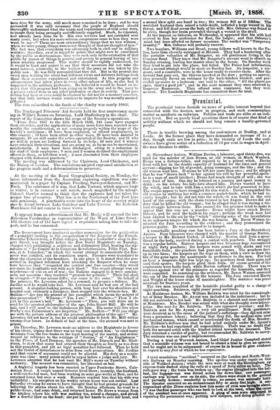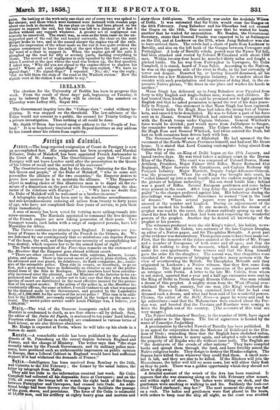Vruniurial.
The provincial towns furnish no news of public interest beyond that connected with the Assizes, now in progress, and such commonplace matter as accidents on railways. Polities and trade are alike at an ordi- nary level. But on purely local questions there is of course that kind of activity without which we should not long remain a locally-governed people.
There is trouble brewing among the coal-miners at Dudley, and at Leeds. At the former place they have demanded an increase of is. a day, though coals are low in price ; in the vicinity of Leeds the coal- owners have given notice of a reduction of 15 per cent in wages in April : the men threaten to stag.
At Shrewsbury A eaizes William Davies, a labourer, aged thirty-five, was tried for the murder of 'Ann Evans, an old woman, at Much Wenlock. Evans was a fortune-teller, and reputed to be a potent witch. Davies lived with her in the double capacity of husband for the time and general servant—digging her bit of ground, going messages, and the like ; and the old woman kept him. It seems he left her more than once ; and he alleged that he was "drawn back" to her against his will by her powerful spells : he is a man of small intellect ,• Evans had much strength of will; she was very fond of him. One day he loitered on a journey and spent money in drink ; on his return his lady-love abused him. Davies wanted to leave the witch, and to take with him a watch which she hail presented to him. The couple appear to have struggled for this watch : Davies vanquished the old woman by stabbing her with a common pocket-knife, which he had re- cently bought ; but he did not take the watch—it was found in the cold hand of the corpse, with the chain twisted in her fingers. Davies did not deny that he killed the old woman ; but he alleged that it was during a vio- lent struggle between them. The counsel for the prisoner tried to make it appear that this was not a murder : Evans might have struck Davies fiercely, and he used the knife in his anger ;. perhaps the weak man had been excited to the act by the " witch " uttering some of the incantations in an unknown tongue for which she was famous. Mr. Baron Watson in- structed the Jury according to the evidence ; and they pronounced the prisoner guilty. He was sentenced to be hanged.
A remarkable poaching case has been before a Jury at the Shrewsbury Assizes. Four labourers were charged with the murder of George Norton, a keeper to Mr. Richard Corbet, of Adderley. Norton died from a spear. thrust in the body, received during a contest with poachers. The struggle was a regular battle. Sixteen keepers and two ferocious dogs encountered at night forty poachers; the keepers were armed with sticks and very formidable flails ; the poachers had guns and spears. The poachers drew up in two lines; the keepem set the dogs on them, with. a view to draw the fire of the gime upon the quadrupeds in preference to the men. For half an hour a desperate fight was kept up ; the poachers fired their guns and used their spears,• the keepers plied their flails. Of course several of the combatants were badly hurt, while Norton suffered fatally. There was no evidence against two of the prisoners as regarded the homicide, and they were acquitted. In summing-up the evidence, Mr. Baron Watson censured the use of the ferocious dogs by the keepers. The Jury convicted Harris and Wright of the leaser crime of manslaughter. The sentence was penal servitude for fourteen years.
The two men acquitted of the homicide pleaded guilty to a charge of night-posehing. Sentence, eight yeara penal servitude. At Maidatone Assizes, Mr. William Baldwin was tried for the raazislaugh- ter of Betsy Brooker. Mr. Ayerst was included in the indictment; but he did not surrender to his bail. Mr. Baldwin is a chemist and man-midwife at Maidstone. Mrs. Brooker was seized with what she thought were labour- pains. She sent for Mr. Baldwin. The case appeared peculiar ; and Mr. Baldwin sent for Mr. Ayerst, a very old practitioner. Both gentlemen were deceived as to the cause of the patient's sufferings—they did not arise from a premature labour; believing that they did, the medical men used mechanical means, which caused or accelerated the death of Mrs. Brooker. Mr. Baldwin's defence was that he had acted entirely under Mr. Ayerst direction—he had repudiated all responsibility. There was no doubt that both the accused acted with the kindest intent towards the deceased. The Jury returned a verdict of guilty, but recommended Mr. Baldwin to mercy. The sentence was one year's imprisonment.
During a trial at Warwick Assizes, Lord Chief Justice Campbell stated that a scientific witness was not bound to attend a trial to give an opiiii0M and he ought not to be imbptenaed : of course he is hound to give evidence in regard to any feet of which he has cognizance.
A moat scandalous " accident " occurred on the London and North-West- em Railway on Monday morning. The up-line was under repair on this side of Watford station; while the men were at work the Birmingham up express-train dashed along the rails at a speed of forty miles an hour. The rails gave way, the train was broken up ; the engine ploughed into the bal- last, the luggage-van was forced across the down-line, one passenger carriage was turned over on its side, the others were stuck in the ground and partially broken; wonderful to relate, no person was seriously hurt. The disaster occurred on an embankment fifty or sixty feet high. A cor- resTondent of the Times explains how this scene of ruin was brought about. "1 was the first passenger who ran back to look at the road, when the cause of the accident was-at once apparent. A game of men were employed in repairing the permanent way, putting new sleepers, and doing general re- pairs. On looking at the work only one chair out of every two was spiked to the sleeper, and those which were fastened were fastened with wooden pegs about one inch in diameter. In one place no chair had been placed on the sleeper to support the rail, but the rail was left to a distance of 6 feet 6 Inches without any support whatever. A greater act of negligence can scarcely be conceived. The result was, as soon as the train came on the un- supported part of the rail the rail bended outwards, the chair on the next sleeper broke in two, and at the second sleeper the engine ran off the rails. From the impression of the wheel made on the rail it was quite evident the engine commenced to leave the rails at the spot where the rail gave way for want of a chair to support it. When the engine got off the rails it ploughed up the road for fifty or seventy yards, dashing everything to atoms. The second act of negligence is only equalled by the first—namely, when I arrived at the spot where the road was broken up, the first question I asked was, Why did you not signal to the engine-driver to slacken his speed ? Where are your signal-flags ?' The men replied, We have no signal-flags.' 'No signal-flags ?' I repeated.'No, 1 sir,' was the reply; but we told,them the state of the road at the Watford station.' How the signals were at the station I am unable to say."



























 Previous page
Previous page